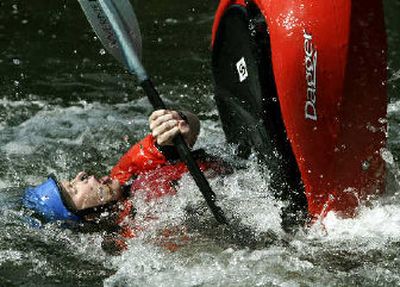A quest for whitewater thrills

YAKIMA – A group in Yakima has been working to transform sections of the Naches and Yakima rivers in hopes of creating the state’s first official whitewater park, though they trail a similar effort being made in Spokane.
But if several parks are created, so much the better, they say.
Recently, advocates in Yakima finished an evaluation of sites on the Naches and Yakima rivers, but have yet to launch a construction fund-raising campaign.
Advocates in Spokane already finished studying locations for a whitewater park on the Spokane River and received $400,000 in state funding.
The big unknown is the permitting and environmental review process aimed at resolving questions about altering a river’s bed.
To create a water park’s drops and pools, boulders are anchored in the river, creating waves and other features that challenge boaters and rafters. The rocks also can help fish habitat by creating deep pools that become resting places for trout, while the rushing water increases oxygen supplies for fish.
Parks are being built or are in operation in several other states, including Texas, Colorado and California. But in Washington, proponents are wading into uncharted territory.
In an effort to ease potential opposition, advocates in Spokane reached out to more than two dozen different groups, including Indian tribes, area business groups and nearby property owners, during their planning process.
In Yakima, kayaker Greg Huefner and others began shopping the idea to city officials and the Yakima Valley Convention Bureau and Visitor Center after the idea was conceived nearly three years ago.
“I wanted a place to surf that was close to home,” said Huefner, who has been kayaking in the Yakima Valley for nine years. “If we could get the location close to downtown, then I could go during lunch or after work and that’d be awesome.”
The Yakima Kayak Club created a three-person steering committee and hired Boulder, Colo.-based Recreational Engineering and Planning to scout locations and complete a site evaluation. The club is hammering out design and cost details and breaking up the project into manageable phases.
Project costs are expected to be from $200,000 to $800,000, depending on the design, said Scott Shipley, a mechanical engineer and former Olympic kayaker who works for Recreational Engineering and Planning.
Next, the group plans to seek state grants aimed at providing recreational opportunities and private grants. Additional money will be raised through benefit events.
Without seeing specific design plans, state Department of Ecology officials can’t say if placing boulders that redirect river flows would endanger fish habitat or harm water users such as farmers.
Spokane’s efforts “makes it easier because it paves the way,” said Nick Sloan of the Yakima Kayak Club. “We’ll have to contact a lot of the same types of agencies for permits, and hopefully by the time we get to that point, a lot of the work has been done.”
The estimated cost for the Spokane park is $450,000, with more than 90 percent covered by the Legislature’s appropriation. Over $30,000 has been raised in private donations.
Proponents of a Yakima park are unfazed that they’re trailing Spokane.
“I think it will be great to have more in the state,” Sloan said. “And Spokane is farther east so we’ll be closer for visitors coming from the (Puget Sound region) or from Oregon.”
In addition, multiple parks would mean whitewater events similar to rodeo circuits could be scheduled back-to-back, drawing a larger number of out-of-state kayakers.